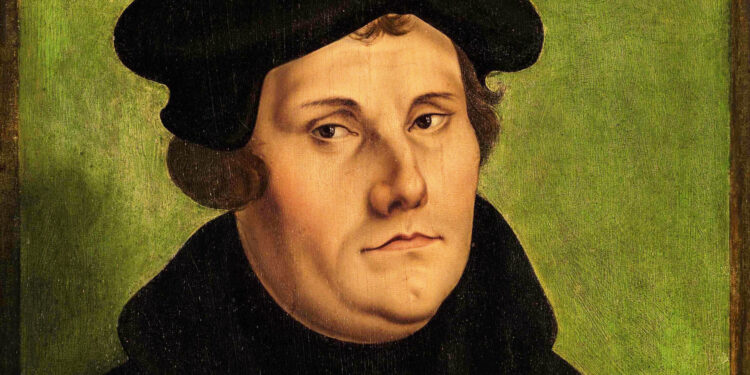Martin Luther (1483-1546) was a German theologian, priest, and seminal figure of the Protestant Reformation who fundamentally challenged and transformed Western Christianity. Born to a copper miner’s family in Eisleben, Luther initially studied to become a lawyer before a dramatic event changed his life course. During a severe thunderstorm in 1505, he vowed to become a monk if he survived, leading him to join the Augustinian order.
As a monk and professor of theology at the University of Wittenberg, Luther struggled deeply with questions of salvation and divine justice. His intensive study of Scripture, particularly the Epistles of Paul, led him to develop his revolutionary doctrine of “justification by faith alone.” This theological breakthrough directly challenged the Catholic Church’s teaching that salvation required both faith and good works.
Luther’s most famous act came on October 31, 1517, when he allegedly nailed his Ninety-five Theses to the door of Wittenberg’s Castle Church. These theses primarily criticized the Church’s practice of selling indulgences—documents claiming to reduce punishment for sins. While the physical nailing may be legendary, the publication of these theses sparked a movement that would transform Europe.
The Catholic Church’s response was swift and severe. Pope Leo X demanded Luther recant his writings, and when he refused, Luther was excommunicated in 1521. Summoned to the Diet of Worms to defend his views, Luther famously declared he could not recant unless convinced by Scripture and reason. Following this, Friedrich the Wise of Saxony protected Luther by hiding him in Wartburg Castle, where he translated the New Testament into German, making Scripture accessible to common people.
Luther’s impact extended far beyond theology. His translation of the Bible standardized the German language and inspired similar vernacular translations across Europe. His emphasis on literacy and education for both boys and girls influenced the development of public schooling. His marriage to former nun Katharina von Bora in 1525 established a model for Protestant clergy families.
Luther’s legacy is complex and far-reaching. While he promoted individual religious conscience and challenged ecclesiastical authority, he also wrote hostile works against Jews and supported the violent suppression of peasant revolts. Nevertheless, his ideas about religious freedom, individual interpretation of Scripture, and the priesthood of all believers fundamentally shaped Protestant Christianity and influenced modern concepts of individual rights and liberty of conscience.
Today, Luther’s influence continues through the hundreds of millions of Protestants worldwide, and his emphasis on the individual’s direct relationship with God remains a cornerstone of Protestant theology. His challenge to institutional authority and advocacy for reform resonates well beyond religious spheres, making him a pivotal figure in Western history.
newshub




Recent Comments